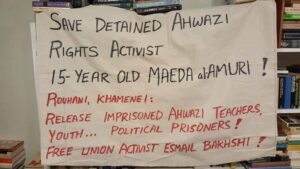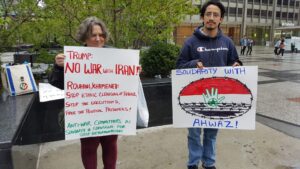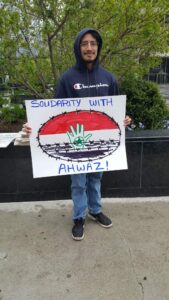On Saturday, 11 May, various American rights groups held a rally in Chicago in support of Ahwazi rights, condemning the decades-long racist oppression and injustice inflicted on the Ahwazis in the south and southwest Iran by successive Iranian regimes, enabled by international silence and indifference.

The rally came as the Iranian regime steps up its already brutal repression of Ahwazi activists in recent weeks, arresting and imprisoning dozens of volunteer aid workers who rushed to help some of the 500,000-plus fellow Ahwazis made homeless by recent massive flooding in the region; the flooding has been exacerbated by the regime’s decision to divert floodwater to residential areas and farmlands in order to protect the oil and gas facilities in the delta area opening into the Gulf. Rather than helping the dispossessed people, the regime’s infamous Islamic Revolutionary Guards Corps (IRGC) has deployed forces and heavily armed Tehran-affiliated foreign militias, including Lebanese Hezbollah, Iraqi Hashd al Shaabi and Afghan Fatemiyoun militiamen, to prevent protests and arrest activists bringing aid, fearing that this self-organised aid effort may increase support for independence and intensify anger at the regime.
Two of the Ahwazi activists arrested for their cultural, civil and political activism, Abdullah Karmollah Chab and Ghassem Abdullah, have been sentenced to death on charges of “enmity to God” following a typically brief kangaroo trial, which has been described as “grossly unfair” by Amnesty International. Amnesty added “confessions” they have said were taken under torture and other ill-treatment, including electric shocks.

The rights activists protesting in solidarity with Ahwaz in Chicago on Saturday held banners with various slogans calling for an end to the ethnic cleansing of Ahwazis and a release of unjustly detained Ahwazi political prisoners, with protesters expressing their solidarity and support with the long-oppressed people. The demonstrators in Chicago also distributed leaflets to passers-by explaining the Ahwazis’ plight and the terrible historical injustice they have been subjected to and detailing how the Iranian regime seeks to drive these people from their homelands and deny their history or existence in order to seize their natural resources.
Joe Hill, the main organiser of the Chicago rally, explained that such events are effective in raising awareness amongst Americans about the long-neglected Ahwazi cause.

He said that the Ahwazi people have suffered historic and systematic injustices, persecution and oppression, including mass killings, racist legislation, and the denial of the most fundamental human rights, with their homes and lands confiscated without warning and with no hope of compensation. Hill asserted that the international community should take concrete steps to force the Iranian regime to end its inherently discriminatory system that has brought heart-breaking sufferings to generations of Ahwazis and left the people of the region in a situation of poverty and destitution. He added that the regime’s media blackout means that the Ahwazi cause is largely unknown in the West, condemning the shameful silence by Western media and human rights organisations towards suffering on a staggering scale.
New York-based international human rights lawyer Irina Tsukerman lauded the rally in Chicago and said that although this demonstration was small, there is no doubt that events of this nature help to increase awareness of the Ahwazi people’s plight. “ The regime has managed to delegitimise Ahwazis’ quest for self-determination by essentially criminalising every aspect of Ahwazi identity and working to force pan-Persian identity on everyone inside the country,” Tsukerman wrote in a statement about the event, adding, “Ahwaz was actually forcibly annexed; since none of the efforts to ensure autonomy and protection of cultural identity materialised, many Ahwazi activists increasingly turned towards a quest for independence. The regime is supposed to be the guarantor of security for all its citizens regardless of ethnic or religious background; in fact, however, Tehran has treated the Ahwazis as second class, disposable citizens and cynically abandoned them. During the recent flooding crisis, in an attempt to secure its own financial interests which rest in protecting the oil fields leased to China. The regime has no legitimacy; by abandoning its citizens in need, it showed itself once again to be unworthy of governance. Increasingly, self-determination appears to be the only way for Ahwazi to ensure that never again such misfortunes and organised atrocities can marginalise and disempower them.”
She continued, saying, “Unfortunately, most Iranians have also failed to condemn their government’s rampant, systemic abuse and discrimination against Ahwazis. So long as this ethnocentrism prevails throughout the country, Ahwazis cannot hope for support from the Persian population. If they want to live freely and to be treated with respect and dignity, they must have a means of defending themselves and preserving their identity, which can only happen if they regain their independence.”
The lawyer added, “According to international law, if a nation has a distinct history, culture, language, territorial claims, and economic means, like the bountiful natural resources and oil and gas wealth of Ahwaz, it meets the criteria for self-determination as established and recognised by the international community.
“Ahwaz is not a new or fictional creation by politicians. On the contrary, its history dates back 2500 years and more, and by all accounts, this is an Arab nation much closer culturally and linguistically to Arab states in the region than to Persians.
“As an independent nation, by regaining its former status, Ahwaz can develop into a prosperous modern state and use its wealth to advance knowledge and help modernise the region and peaceful relations with humanity. Under the yoke of Iranian domination, it is just one more oppressed peoples mired in poverty and hardship.
“Iran’s annexation did not help anyone except in filling the coffers of its leadership. It is time to give voice to the people most directly affected by decisions on which they were never consulted.
The US government, including the Trump administration, erroneously address all of Iran as a Persian nation, culture, and civilisation, which feeds into the false narrative about the diversity and inclusion of that society perpetuated by Tehran.”
Talking about the Iranian regime’s ethnocentric policies, Tsukerman wrote, “Over 70 per cent of Iranian citizens are not Persians and are discriminated against for retaining their identities. Therefore, they cannot be integrated into this ethnocentric nationalism by force, rhetoric, or wishful thinking.
“Ahwazis, Kurds, Turks, and Balochis are not an exception. When the US government refers to the whole of the country as Persians, it engages in a denial of the history, culture, and identity of the oppressed non-Persian national ethnic minorities, and contributes to the perpetuation of Tehran-led abuse and false propaganda.
“We often forget that the current borders in the Middle East were largely drawn up by the colonial British and the French. There are no logical reasons why European self-serving and damaging colonialist policies must be the final word on national rights to self-determination. Who is being served by forcing nations with an independent identity to remain subservient to states that will never treat them equally? Only oppressive regimes benefit from this clinging to the relatively recent past.”
Iranian regime officials have been able to engage in criminality for years with relative impunity against the Ahwazi people. Their oppressive and abusive tactics are not isolated events, as for decades, they have increasingly committed gruesome acts against Ahwaz’s defenceless people. The UN should pay more attention to the Ahwazi prisoners’ issue. The international community should carefully look at the grievances of Ahwazis in order for justice to be achieved there.
By Rahim Hamid, an Ahwazi author, freelance journalist and human rights advocate. Hamid tweets under @Samireza42.
